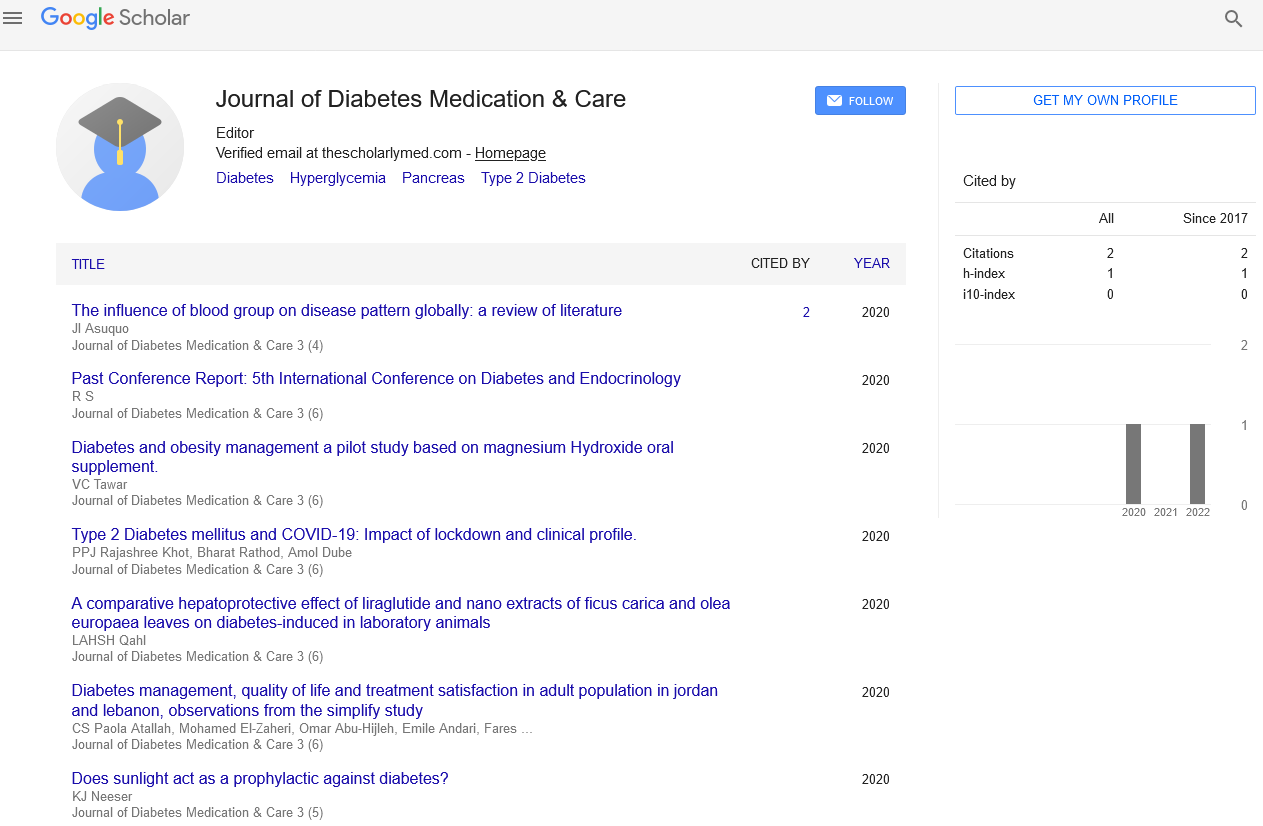Perspective - Journal of Diabetes Medication & Care (2023) Volume 6, Issue 6
Navigating the Maze of Diabetes Complications: Beyond Blood Sugar
- Corresponding Author:
- Micheal Carol
Department of Endocrinology, University of Patea, Patea, New Zealand
E-mail: Mic@84gmail.com
Received: 06-Nov-2023, Manuscript No. jdmc-23-122618; Editor assigned: 09-Sep-2023, PreQC No. jdmc-23-122618 (PQ); Reviewed: 23-Nov-2023, QC No. jdmc-23-122618; Revised: 11-Dec-2023, Manuscript No. jdmc-23-122618 (R); Published: 18-Dec-2023, DOI: 10.37532/jdmc.2023.6(6).160-161
Introduction
Diabetes, a chronic condition affecting millions worldwide, is often characterized by high blood sugar levels. While managing blood glucose is crucial, diabetes complications extend beyond the realm of hyperglycemia. This article delves into the intricate web of diabetes-related complications, exploring the impact on various organs and systems within the body.
Description
Understanding diabetes
Diabetes is a metabolic disorder that occurs when the body either doesn’t produce enough insulin (Type 1 diabetes) or cannot effectively use the insulin it produces (Type 2 diabetes). Insulin is a hormone crucial for regulating blood sugar (glucose) levels. Elevated blood glucose can lead to a cascade of complications, affecting both small and large blood vessels throughout the body.
Cardiovascular complications
One of the most prominent and life-threatening complications of diabetes is cardiovascular disease. Individuals with diabetes are at a higher risk of developing conditions such as coronary artery disease, heart attack, and stroke. High blood sugar levels contribute to the formation of fatty deposits in blood vessels, leading to atherosclerosis. This narrowing of arteries restricts blood flow, increasing the likelihood of cardiovascular events.
Managing diabetes and maintaining a healthy lifestyle are essential in preventing cardiovascular complications. Regular exercise, a balanced diet, and medications can help control blood sugar levels and mitigate the risk of heart-related issues.
Neuropathy: Nerve damage unveiled
Diabetic neuropathy is a condition that arises from nerve damage due to prolonged exposure to high blood sugar levels. It commonly affects the peripheral nerves, causing symptoms such as numbness, tingling, and pain in the extremities. Over time, neuropathy can lead to complications such as foot ulcers and infections, increasing the risk of amputations.
Proactive management involves meticulous foot care, regular monitoring, and maintaining stable blood sugar levels. Medications and lifestyle modifications are also integral components of neuropathy prevention and treatment.
Retinopathy: The silent threat to vision
The eyes are not immune to the ravages of diabetes. Diabetic retinopathy is a condition characterized by damage to the blood vessels in the retina, the light-sensitive tissue at the back of the eye. As the condition progresses, it can lead to vision impairment and even blindness.
Regular eye examinations, strict blood sugar control, and lifestyle changes can help prevent and manage diabetic retinopathy. Early detection through screenings is crucial for initiating timely interventions.
Nephropathy: Kidney complications unveiled
The kidneys play a vital role in filtering waste products from the blood. Diabetes can impair this function, leading to diabetic nephropathy. Persistent high blood sugar levels contribute to damage in the small blood vessels of the kidneys, eventually resulting in impaired kidney function and, in severe cases, kidney failure.
Monitoring blood pressure, maintaining optimal blood sugar levels, and adopting a kidney-friendly diet are essential in preventing and managing diabetic nephropathy. Medications may also be prescribed to protect kidney function.
Gastrointestinal complications
Diabetes can affect various aspects of gastrointestinal function, leading to complications such as gastroparesis and fatty liver disease. Gastroparesis is characterized by delayed stomach emptying, causing symptoms like nausea, vomiting, and abdominal pain. Fatty liver disease, on the other hand, involves the accumulation of fat in the liver and may progress to more severe conditions like cirrhosis.
Managing diabetes through diet, medication, and lifestyle changes is crucial for preventing and alleviating gastrointestinal complications. Dietary modifications, including fiber intake and portion control, can contribute to better gastrointestinal health.
Mental health: The unseen battle
The impact of diabetes extends beyond the physical realm, taking a toll on mental health. The chronic nature of the condition, coupled with the demands of daily management, can contribute to stress, anxiety, and depression.
A holistic approach to diabetes care should encompass mental health considerations. Support groups, counseling, and mindfulness techniques can aid individuals in coping with the emotional challenges associated with diabetes. Integrating mental health into diabetes care can lead to better overall well-being and improved adherence to treatment plans.
Conclusion
Diabetes is a complex condition with far-reaching implications for various organs and systems in the body. Beyond the immediate focus on blood sugar control, understanding and addressing the diverse complications associated with diabetes are paramount. A multidimensional approach, encompassing lifestyle modifications, medication adherence, and regular medical monitoring, is essential in mitigating the risks and enhancing the overall well-being of individuals living with diabetes. By unraveling the intricacies of diabetes complications, we pave the way for a more comprehensive and effective approach to diabetes management.

